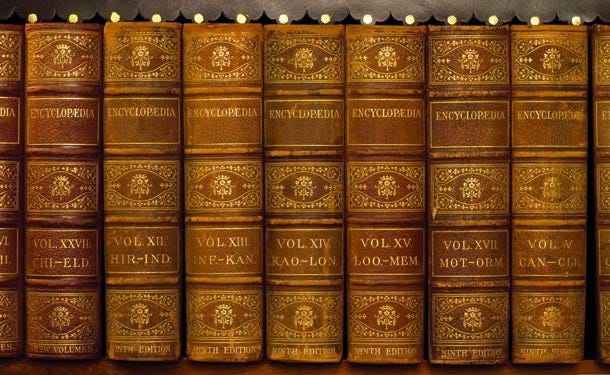Minor Roots: -PEDIA
You couldn't drop knowledge if you threw an encyclopedia off a cliff.
Saturdays are perfect days for compendious surprises. Surprise—we’re talking about words with the suffix -PEDIA today!
The root PED- meaning child acquires connotations of education via words like pedagogy. Consequently, the root may appear as the suffix -PEDIA to describe a volume of knowledge, going back to the original Greek for encyclopedia meaning general or all-around education:
encyclopedia (noun) - a reference work or compendium providing summaries of either general or special knowledge
BREAKDOWN: EN- (in) + CYCL- (around) + -PEDIA (volume of knowledge)
—encyclopedic means covering a comprehensive range of knowledge
Hardly anyone owns encyclopedias anymore, although possessing a full set was standard as recently as the late 20th century. Today, we have all kinds of other -PEDIAS, starting with the ubiquitous Wikipedia. A wiki is an open website that allows users to collaboratively create and edit pages. The word wiki is derived from the Hawaiian word wikiwiki meaning quick:
Wikipedia (noun) - a free, collaboratively edited, online encyclopedia supported by the non-profit Wikimedia Foundation
BREAKDOWN: WIKI- (collaborative site) + -PEDIA (volume of knowledge)
Really, any vast collection of information can be described as a -PEDIA, as these examples illustrate:
Emojipedia (noun) - a website that serves as a comprehensive reference for the meaning, usage, and appearance of individual emoji characters
BREAKDOWN: E- (picture) + MOJI- (character) + -PEDIA (volume of knowledge)
pharmacopedia (noun) - a volume with detailed information about drugs and medicinal preparations
BREAKDOWN: PHARMACO- (drug, poison) + -PEDIA (volume of knowledge)
—a pharmacopoeia is an official publication describing chemicals, drugs, and other substances and how they are used as medicines
Wookieepedia (noun) - an online encyclopedia for information about the Star Wars universe
Alas, the internet is also littered with abandoned efforts to fully focus all of the knowledge of a given field into one compendious volume. Truly, the age of the encyclopedia has passed.
“Order, unity, and continuity are human inventions, just as truly as catalogues and encyclopedias.” —Bertrand Russell



